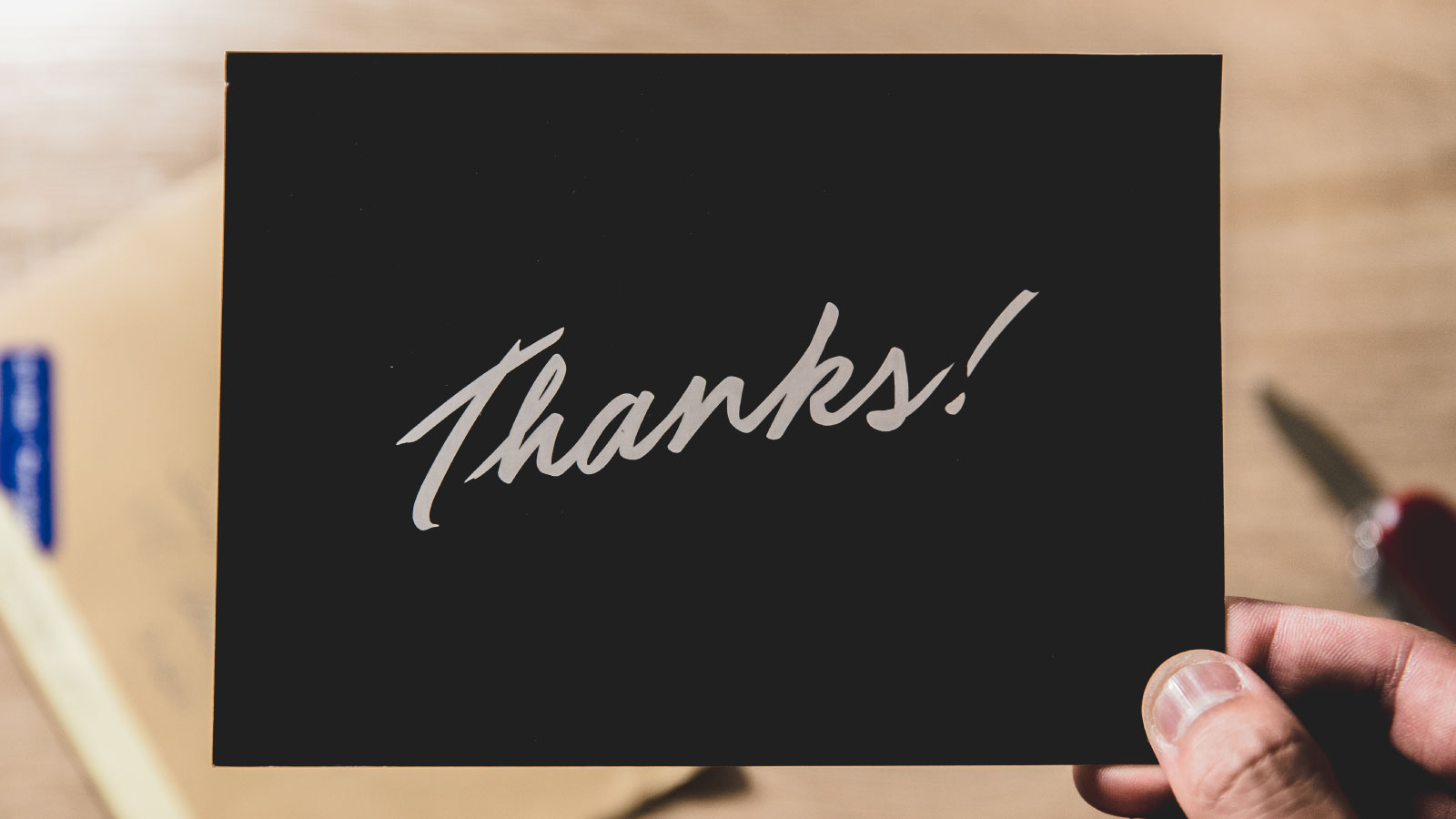After your interview, a little thanks can go a long way.
Good manners alone won't land you a job, but their absence can go a long way in keeping you off the payroll. A warm smile, gracious manner and plentiful expressions of gratitude will leave a good impression on any recruiter ‒ but you should be going one step further: a thank-you note after the interview.
Is it really worth risking overenthusiasm by penning an interview thank-you letter? In a word, yes. A survey conducted by TopResume found 68 per cent of hiring managers said receiving a thank-you email after an interview impacted their decision-making process, with almost a fifth admitting to having discarded a hopeful for not extending the courtesy.
Having impressed with your CV and braved a face-to-face grilling, put the cherry on your job application by following our advice for post-interview thank-you notes.
Don't delay
You've likely been one of more than a dozen interviewed applicants during the hiring process. That's a decent sized pack, meaning you're at risk of slipping onto the fringes if you're not proactive with your follow up.
Don't hesitate in sending your interview thank-you email or note ‒ with each day elapsed it loses its impact. After the rigours of a job interview, you've earned a little downtime, but come evening you should be sitting down to draft the message. Ideally, you should write a thank you within 24 hours of the interview (or the next business day, if your interview was on a Friday or before a holiday).
Don't overdo it
While not formally part of the assessment process, a post interview thank-you note will influence how an interviewer or hiring manager regards you. You're aiming for a positive impression with your expression of gratitude, but be mindful that if poorly judged, this note can act against you.
Perhaps the biggest risk is overstating your feelings. Being overly grateful will look crass, like you're trying to curry favour after the fact.
Keep the tone light and pacey, avoiding hyperbole ('thank you so so much', 'this has been the absolute greatest opportunity' etc.) and maintain professionalism throughout. Your sugary sweetness may sound good in your head, but it's best kept for a beau's birthday card!
Customise each thank-you message
If nailing a lasting impression is the ultimate goal of a thank-you note after your interview, sending something generic is a non-starter.
Following a general template is fine, but ensure that each letter is customised to the receiver. Of course that means addressing them by name, but it also means the inclusion of any extra tidbits you might've picked up in your conversation together. Perhaps your interviewer mentioned they were attending an event later or celebrating a birthday. A cursory, classy reference to those sorts of things will show warmth and conscientiousness.
In general, you can get away with saying “Dear Company Name” on a cover letter; however, at this point, you should be able to use a person's name to personalize your thank-you letter. And if you had more than one interviewer, be sure to send each a separate note.
Reiterate attributes and enthusiasm
A thank-you note after an interview isn't so much an extension of a job application as it is an embellishment. As such, it's no place to be extolling your virtues in any great length. Still, it does offer the chance for one final flurry of self-promotion.
In no more than a sentence or two, reiterate why you believe you're right for the job, how your experience in the interview has confirmed that, and that ‒ having been put through your paces ‒ you're keener than ever to land the position.
Keep in mind company culture
Key to all areas of the application process, a thank-you letter after an interview should be drafted with the company's culture in mind.
Nine times out of 10, correspondence should be sent electronically. Email is faster, more easily received and is the recognised medium for professional back-and-forths. Say the organisation is especially formal, however, or is known to value traditional practices. In that case, it might be worth sourcing some decent quality paper and penning the note by hand.
Likewise, the employer's character should dictate the tone of the letter. A young, hip startup is likely to appreciate something quite informal and light-hearted for instance, whereas a law firm may be more receptive to a note more formally composed.
Keep it brief ‒ and mind the details
A thank-you message should be a complement to an application, not an extension, so keep it brief. A sentence expressing your gratitude, one or two more on your abilities and enthusiasm and you're done.
Make sure to run it through a spell-checker or past a keen grammatical eye before sending as well, as any mistakes ‒ however minor ‒ will reflect badly. As we said, it may not be part of the official application process, but it will still affect an employer's impression of you.
Here is a great example of a winning thank-you note
Dear Interviewer Name,
Thank you for taking the time to talk to me yesterday about the Project Management position ABC Company has available. It was my pleasure to meet you and learn more about the role and the company.
I was especially impressed by the pioneering methods ABC Company is taking with ensuring global expansion and transformational change in support of infrastructure updates. Based on my experience in BCD Role at XYZ Company that allowed me to manage and update project goals and streamline improvements based on current tech trends and company needs, I remain confident that my place at ABC Company will be a mutually beneficial arrangement.
I am excited about the next steps and look forward to hearing from you about the prospect of joining your team. Please feel free to reach out to me any time via email or phone if you require additional information about my background.
Best Regards,
Candidate Name
The takeaway
'Good manners cost nothing', as the old adage goes. In the job-hunt game, their absence can cost a good candidate the position they've worked so hard to secure. A thank-you message takes very little effort to write, and it can pay dividends in the end. So take the time, put your appreciation down on paper and reap the rewards of a little gratitude!
Before the interview and the thank-you notes, you have to impress with your CV. Submit for a free CV critique to learn if your CV is interview-worthy.
Editor's note: This post was originally published in 2019 and has been updated to include an example written by resume writer and career advisor Marsha Hebert.
Recommended Reading:
-
The 15 best questions to ask a hiring manager in an interview
-
The signs of a bad interview that mean you didn't get the job
 Alasdair Lane
Alasdair Lane 